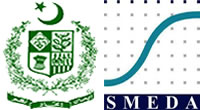|

Acute energy shortage is the supreme challenge of Pakistan. Most of the industrial sectors in Pakistan are energy intensive and are vulnerable to high rate of energy losses across various production processes resulting in higher energy bills and productivity losses. This problem has significant financial impact on the industrial sectors and severely affects the competitiveness in export markets. The energy cost as a share of total production cost ranges from 20% to 50% in different industrial sectors.
Currently, there is a little awareness and even less expertise is available to counter this issue. Keeping in view the strong need for energy savings and skill development and in order to achieve best energy management practices, SMEDA in collaboration with its international partners like German International Cooperation (GIZ) and Training & Development Centers of Bavarian Employers’ Association (bfz- Germany) is providing following services to the industry relevant to its Energy Efficiency Initiatives:
Energy Audits
SMEDA is conducting Energy Audits in different industrial sectors (e.g. Textile, Jute, Automotive, Furniture, Marble etc) through Energy Efficiency Experts. Academic institutions are also involved in this Programme as their students get trained on energy efficiency and auditing. The experts develop Energy Programme for beneficiary units proposing remedial actions, their feasibility and implementation plan.
Implementation of Energy Management System (EnMS)
An energy management system, like all other management systems, is cyclical in nature. It is a formal system, which requires the support at all levels within the company. Once implemented, it offers a structured approach in dealing with energy issues and is the basis for continuous improvement. EN16001 and ISO50001 are the standards for Energy Management System aiming to help organizations in establishing the systems and processes necessary to improve energy efficiency. This leads to reductions in cost and greenhouse gas emissions through systematic management of energy. The stepwise approach for EnMS implementation is;
- Development of an energy policy
- Appointing an Energy Manager and Energy Team
- Conduct of Initial review/ Baseline Audit
- Development of an Energy Programme
- Establishing documentation system
- Setup/strengthen Energy information system
- Carryout Internal audit/ System evaluation
As a result of Energy audits and Energy Management System, depending upon the nature of sector, identified energy saving potentials in some of the industrial sectors are as follows:
| Sector |
Energy Saving Potential |
| Marble |
5 to 8% |
| Power Looms |
up to 10 % |
| Furniture |
15 to 20% |
| Autoparts |
10 to 15% |
| Jute |
10 to 15% |
| Textile |
10 to 30% |
Energy Manager Training (EMT) Programme
Energy Manager Training is designed for professionals involved in energy management in the industry. EMT aims to develop capabilities of industry professionals in the area of Energy Efficiency and Management to make the industry self reliable in this field. The syllabus for this training has been developed under the guidance of German and Japanese energy experts. This 5 day training Programme consists of Management and Technical issues related to generation and usage of energy. The syllabus contains Introduction to Energy Management System, Energy Information System and Energy Efficiency Potential in Industrial Utilities. The training is offered twice a year.
Development of Energy Service Companies (ESCOs)
SMEDA is promoting EnMS implementation on performance contracting mechanism in SME based energy intensive sectors having potential of implementing energy saving measures. For this purpose, SMEDA is developing Energy Service Companies (ESCOs) on the subject of Energy Management System (EnMS) detailed practical training and later on, the developed ESCOs will be engaged in EnMS projects on performance contracting basis in different industrial sectors.
No. of assisted Units through SMEDA-ISP under Energy Efficiency Initiatives
| |
No. of Assisted Units through SMEDA-ISP |
| Energy Efficiency Initiatives |
| Energy Audits |
| Spinning |
10 |
| Weaving |
8 |
| Processing |
10 |
| Jute |
1 |
| Auto Parts |
2 |
| Furniture |
1 |
| Marble |
10 |
| Total |
42 |
| Energy Management System |
| Spinning |
25 |
| Weaving |
4 |
| Processing |
4 |
| Total |
33 |
Companies interested to participate in these Programmes may contact by letter, fax or email to the under mentioned.
Haseeb Sarwar
Manager
Industry Support Cell-Lahore
This email address is being protected from spambots. You need JavaScript enabled to view it. |
Fouzan Muhammad
Deputy General Manager
Industry Support Cell
This email address is being protected from spambots. You need JavaScript enabled to view it. |
Syed Babar Umar
Manager
Industry Support Cell-Karachi
This email address is being protected from spambots. You need JavaScript enabled to view it. |
|


